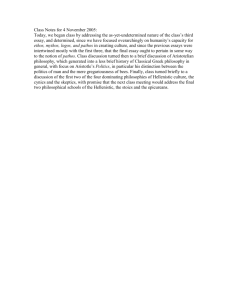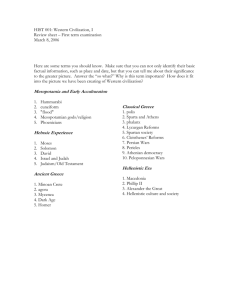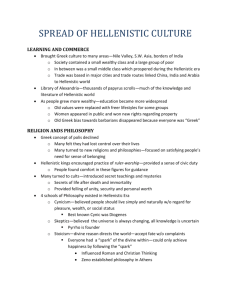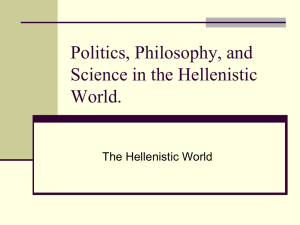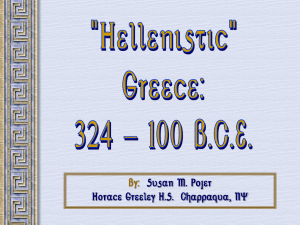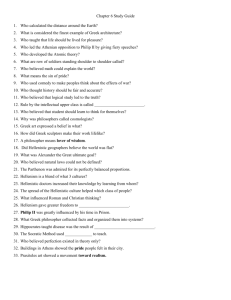Research-Led Teaching in Classics and Ancient History: Hellenistic World Core Module
advertisement
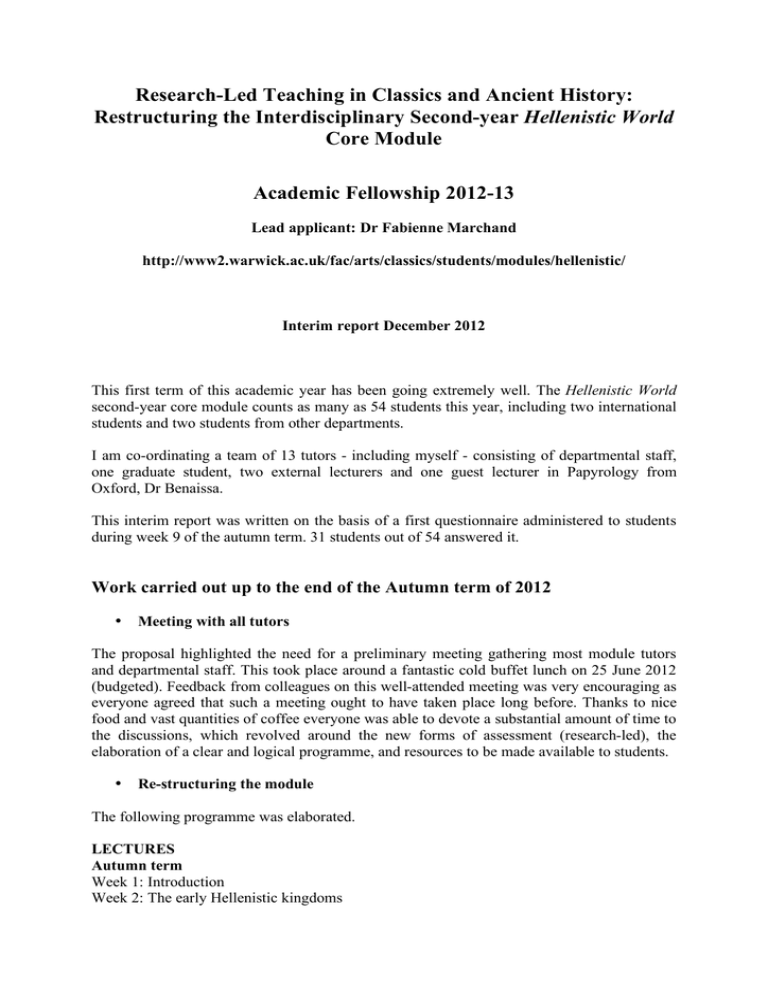
Research-Led Teaching in Classics and Ancient History: Restructuring the Interdisciplinary Second-year Hellenistic World Core Module Academic Fellowship 2012-13 Lead applicant: Dr Fabienne Marchand http://www2.warwick.ac.uk/fac/arts/classics/students/modules/hellenistic/ Interim report December 2012 This first term of this academic year has been going extremely well. The Hellenistic World second-year core module counts as many as 54 students this year, including two international students and two students from other departments. I am co-ordinating a team of 13 tutors - including myself - consisting of departmental staff, one graduate student, two external lecturers and one guest lecturer in Papyrology from Oxford, Dr Benaissa. This interim report was written on the basis of a first questionnaire administered to students during week 9 of the autumn term. 31 students out of 54 answered it. Work carried out up to the end of the Autumn term of 2012 • Meeting with all tutors The proposal highlighted the need for a preliminary meeting gathering most module tutors and departmental staff. This took place around a fantastic cold buffet lunch on 25 June 2012 (budgeted). Feedback from colleagues on this well-attended meeting was very encouraging as everyone agreed that such a meeting ought to have taken place long before. Thanks to nice food and vast quantities of coffee everyone was able to devote a substantial amount of time to the discussions, which revolved around the new forms of assessment (research-led), the elaboration of a clear and logical programme, and resources to be made available to students. • Re-structuring the module The following programme was elaborated. LECTURES Autumn term Week 1: Introduction Week 2: The early Hellenistic kingdoms Weeks 3-4: Antigonids, Seleucids and Attalids down to the Peace of Apameia Week 5: Ptolemies and Ptolemaic Alexandria Week 6: Reading week. Literature and Art Weeks 7-8: Literature Weeks 9-10: Hellenistic Art Spring Term (forthcoming) Economy and Society Week 1: Introduction to Papyrology (guest lecturer: Dr Amin Benaissa, Oxford) Week 2: Economy Week 3: Hellenistic coinage: an introduction Week 4: Religion Week 5: Magic and Science Week 6: Reading week The Coming of Rome Week 7: From Apameia to Actium: the restructuring of the Hellenistic world Week 8: Rome and the Hellenistic World Week 9: Hellenization of Italy Week 10: Reception of Hellenistic poets in Latin poetry Summer Term (forthcoming) Week 1: Athens and Delos Weeks 2-4: Revisions After a first week of introduction, the students were initiated to the formation of the early Hellenistic kingdoms in the aftermath of the death of Alexander the Great. Every dynasty, Antigonid, Seleucid, Attalid and Ptolemaic, was presented, and their main scholarly debates introduced. The second part of the autumn term was devoted to literature and art. The fist part of the spring term will concentrate on Economy and Society. The first lecture will consist of a pilot lecture in Papyrology by Dr Amin Benaissa from Oxford University, and is meant as a bridge between Art/Literature and Economy/Society, as papyri consist both of literary papyri and papyri recording legal documents, tax receipts, etc. Two lectures on economy and coinage will follow, and the last two lectures before reading week will be devoted to various themes of religion, magic, and science. The second part of the spring term will focus on the various roles played by a newcomer in the Hellenistic World, Rome, and on aspects of hellenization in Italy. After a session on two major sites, Athens and Delos, the summer term will be devoted to revisions. SEMINARS Seminar 1: Aspects of Hellenistic kingship I: Plutarch, Life of Demetrius Seminar 2: Aspects of Hellenistic kingship II: Hellenistic kings and their subjects Seminar 3: Aspects of Hellenistic kingship III: portrait of a Hellenistic King Seminar 4: Stoics and Epicureans Seminars 5 and 6: Hellenistic cities Seminar 7: Life in Hellenistic cities Seminar 8: SC de Bacchanalibus A series of eight seminars spread over the first two terms explore various themes connected to the lectures. Most of them focused on primary sources and encouraged students to act as researchers as they had to work original material such as coins, portraits, inscriptions, etc. • Resources booklet As planned a 111-page resources booklet was compiled over the summer by the module leader. It includes translations of inscriptions, papyri, and literary texts, various coins, sculptures, plans of cities, and maps. 50 copies were ordered from Warwickprint (budgeted), and a pdf was also made available online (to staff and students only) at the following address: http://www2.warwick.ac.uk/fac/arts/classics/students/modules/hellenistic/handouts/ Not all students came to pick up their hard copy, which at first sight was disappointing. But statistics generated by Sitebuilder show that until 6 December the Hellenistic resources booklet was viewed as many as 1,134 times! The questionnaire revealed that 28 students out of 31 downloaded a copy on their laptop, and many also on their ipad/tablet, and even smartphone. It seems students prefer the electronic format. This will be investigated further. My guess is that students prefer that particular format because it offers the option of doing keyword searches, but there might be other reasons. It also appears that the resources booklet was advertised among students via Facebook, and that students taking other modules also downloaded and used the booklets. So far I feel that the booklet has been a great success, and that students seem to find it useful. • Students as researchers Besides research-led seminars, the grant enabled me to lead two sub-projects devoted to promoting students as researchers. - creation of two posts of assistant researchers (budgeted) Two undergraduate students who took the Hellenistic module last year were employed to prepare a webpage commenting and presenting various electronic resources relevant to the modules. The page can be found here: http://www2.warwick.ac.uk/fac/arts/classics/students/modules/hellenistic/weblinks/ The two students worked hard and gathered as many as 32 sites on which they shared their views as students. 7 students revealed that they used this page every week, 14 a couple of days during term time. Further investigations will be carried out later in the academic year to assess the usefulness of the page. So far, after having marked the first essay, my impression is that students used these resources as they regularly appeared in bibliographies. Besides, I also feel that fewer irrelevant or inappropriate websites were used by students. - research-based assessment A new type of essay was designed for the autumn term. Questions revolved around a specific primary source (coin, sculpture, inscription, poem), and students needed to carry out personal research in order to complete the task successfully. One essay consisted of the review of a scholarly article, but only one out of 54 students took that option - with success. Marks for this new type of essay were rather high. As planned, the first questionnaire administered to students was notably included questions on the new research-based assessment. It revealed that 29 students (out of 31 who returned the questionnaire) rated 3-4 out of 4 their enjoyment with this new type of essays. 29 rated 3-4 (out of 4) the increase in their confidence to deal with primary sources after writing this new type of essay. 27 rated 3-4 their willingness to write again such an essay, and only one student does not want at all to renew the experience. 23 rated 3-4 their willingness to do more research on primary sources. All other students (7) rated it 2 out of 4, and no student would not want to act as a researcher again. Overall the response from the student on the research-based assessment is extremely positive. Most students enjoyed carrying out a new type of task, and none seemed to be fundamentally against carrying out personal research. The most positive aspect of this new experience is that students feel more self-confident with primary sources. It will be interesting to see whether students will capitalise on it to write their second (traditional) essay. • Budget The following will be spent during the spring term: - 8 January 2013, papyrology pilot lecture by Dr Amin Benaissa (Oxford): £250 + travel expenses (£50) - 6 bought-off lectures (£360) + travel expenses (£90). All other entries in the budget were spent according to plan. Conclusion So far all deadlines have been met and all planned activities have been carried out as described in the proposal. I am confident that the rest of the Fellowship will run smoothly, too. I am particularly happy with the positive response from the students on the resources booklet. Students also enjoyed, and seemed to have learned from, the new approach which focuses on their roles as researcher (research-based assessment). Finally, leading two undergraduates students in their roles as assistants was very rewarding, and I feel that all the students benefited from the results of this experience. I look forward to leading this project to its end, and to report further on it at the end of the academic year.
